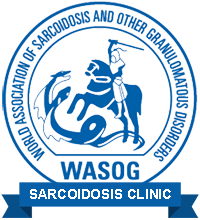Repository corticotropin injection (H.P. Acthar gel) for the treatment of sarcoidosis-induced hypercalciuria and vitamin D dysregulation: A pilot, open label study
Abstract
Background: Vitamin D dysregulation may occur in sarcoidosis patients and result in hypercalciuria, hypercalcemia, nephrolithiasis, and renal impairment. We performed an open label pilot study of highly purified (H.P.) Acthar® Gel (repository corticotropin injection) (RCI) on patients with sarcoidosis-induced vitamin D dysregulation and hypercalciuria. Methods: Nine patients with sarcoidosis-induced vitamin D dysregulation and hypercalciuria on stable maintenance anti-sarcoidosis therapy received 80 units of RCI subcutaneously twice weekly for 12 weeks. 24-hour urinary calcium excretion was measured at baseline and at 12 weeks. Other parameters measured over 16 weeks (including 4 weeks post the last RCI dose) included the following serum values: calcium, 25-OH vitamin D, 1,25- diOH vitamin D and serum parathyroid hormone (PTH). In addition, the Sarcoidosis Health Questionnaire (SHQ) and Short Form-36 (SF-36) as well as a urinary symptom score were measured in all subjects. Results: There was no significant change in the 24-hour urinary calcium excretion over 12 weeks of the study. However, there was evidence that RCI improved sarcoidosis-induced vitamin D dysregulation in that the serum 1,25- diOH vitamin D level significantly declined over 12 weeks. There was also improvement in most of the domains of the quality of life measures, although only a few of them reached statistical significance. There was also a trend toward improvement in urinary symptoms over the study period. The was evidence of the development corticosteroid side effects in the cohort, in that weight significantly increased over the study period. Conclusions: In this small pilot open label trial, 12 weeks of RCI did not significantly improve sarcoidosis-induced hypercalciuria. However, some statistically significant changes in serum vitamin D and PTH levels were demonstrated that were consistent with some amelioration of sarcoidosis-induced vitamin D dysregulation. Several corticosteroid-related side effects were demonstrated in this cohort.
Downloads
Published
Issue
Section
License
This is an Open Access article distributed under the terms of the Creative Commons Attribution License (https://creativecommons.org/licenses/by-nc/4.0) which permits unrestricted use, distribution, and reproduction in any medium, provided the original work is properly cited.
Transfer of Copyright and Permission to Reproduce Parts of Published Papers.
Authors retain the copyright for their published work. No formal permission will be required to reproduce parts (tables or illustrations) of published papers, provided the source is quoted appropriately and reproduction has no commercial intent. Reproductions with commercial intent will require written permission and payment of royalties.

This work is licensed under a Creative Commons Attribution-NonCommercial 4.0 International License.








